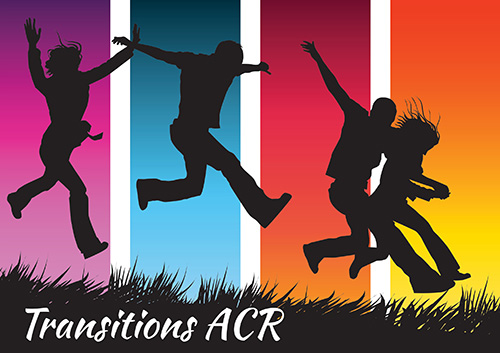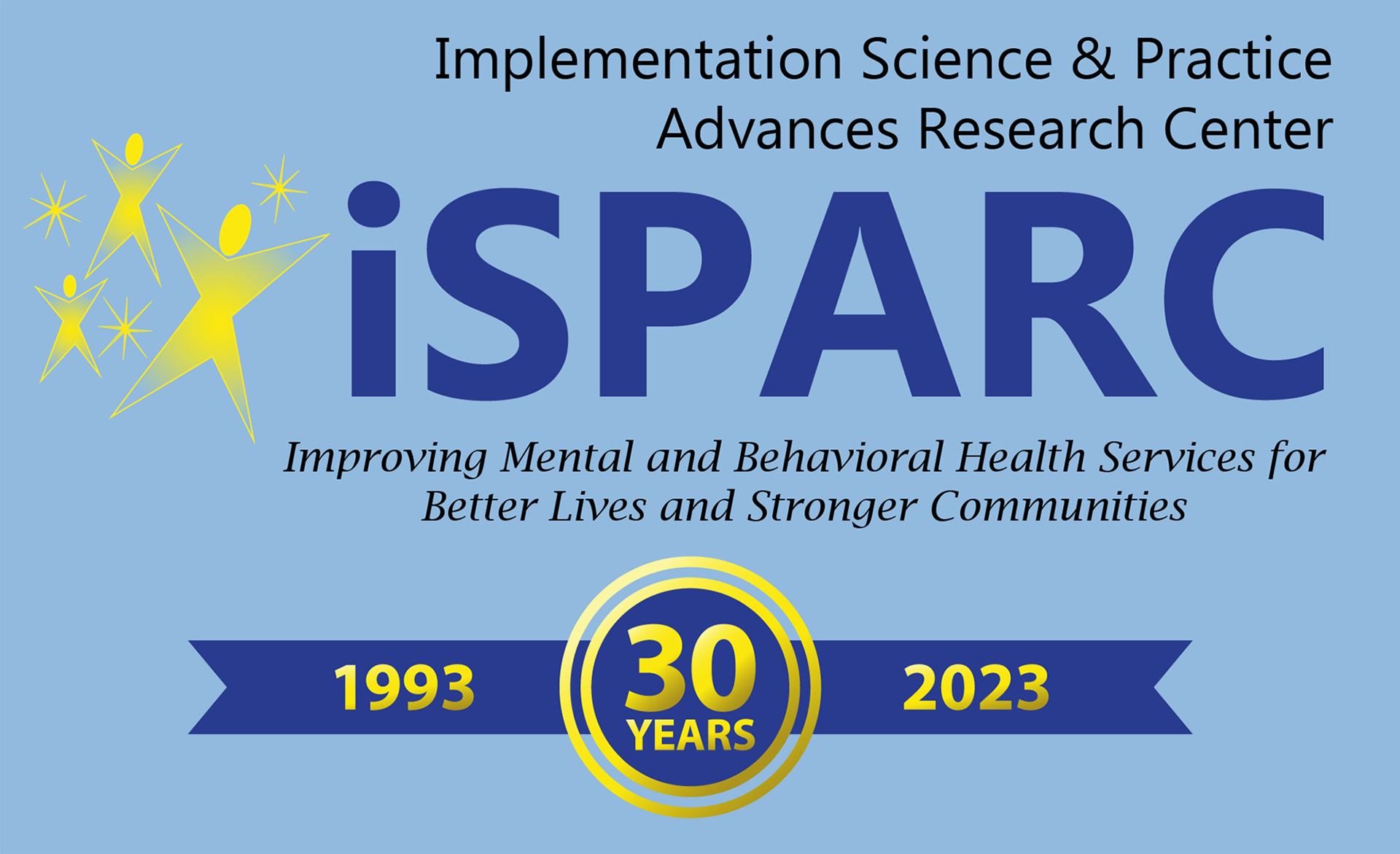Transitions to Adulthood Center for Research
 The Transitions to Adulthood Center for Research (Transitions ACR) is a research center within the Implementation Science and Practice Advances Research Center (iSPARC). Our mission is to improve outcomes for youth and young adults (ages 14–30) with serious mental health conditions (SMHC) through rigorous research, training, and dissemination activities.
The Transitions to Adulthood Center for Research (Transitions ACR) is a research center within the Implementation Science and Practice Advances Research Center (iSPARC). Our mission is to improve outcomes for youth and young adults (ages 14–30) with serious mental health conditions (SMHC) through rigorous research, training, and dissemination activities.
The Transitions ACR employs community-engaged methodologies—most notably, Participatory Action Research—to ensure that the voices and needs of youth and young adults with the greatest vulnerabilities are at the center of our work. Our commitment to equity and inclusion guides our efforts to address the systemic barriers faced by this population. At the heart of all our efforts is a commitment to meaningful partnerships with young adults and their families. We actively involve them in every aspect of our work—from research design to implementation and dissemination—to ensure our initiatives are relevant, impactful, and grounded in lived experience.
The Center is home to two nationally recognized initiatives funded by the National Institute on Disability, Independent Living, and Rehabilitation Research (NIDILRR):
- The Learning & Working During the Transition to Adulthood Rehabilitation Research & Training Center (Learning & Working RRTC)
- The Center for Community Inclusion and Reflective Collaborative (The CIRC Center)
These are the only two NIDILRR-funded Rehabilitation Research and Training Centers specifically focused on young adults with serious mental health conditions.
Our diverse research portfolio also includes projects that address the complex needs of young people with SMHC and co-occurring substance use disorders. For example, one current study evaluates an innovative mobile health intervention—featuring an interactive avatar—designed for emerging adults who binge drink and experience suicidal thoughts. Other projects aim to support high school students with mental health conditions, including those enrolled in special education or career and technical education programs.
We also provide training and technical assistance in areas such as career development, youth advisory engagement, and program implementation. A signature offering is HYPE (Helping Youth on the Path to Employment)—a structured, manualized program that promotes career development among youth and young adults with mental health conditions.
Meet the Researchers:

Kathryn Sabella, PhD
Assistant Professor of Psychiatry & Director of Transitions ACR

Lourah Kelly, PhD
Assistant Professor of Psychiatry

Marsha Ellison, PhD
Professor of Psychiatry

Colleen McKay, MA, CAGS
Assistant Professor of Psychiatry

Michelle Mullen, PhD
Assistant Professor of Psychiatry
Research:
The Center for Community Inclusion and Reflective Collaboration (The CIRC Center)
Title: The Center for Community Inclusion and Reflective Collaboration (The CIRC Center)
Dates: 9/1/2023-8/31/2028
Funder: National Institute on Disability, Independent Living, and Rehabilitation Research (NIDILRR) and Substance Abuse and Mental Health Service Administration (SAMHSA)
Grant Number: 90RTCP0010
Funding: $4,375,000
PIs: Kathryn Sabella, Ph.D., UMass Chan Medical School, and Elizabeth Thomas, Ph.D., Temple University
Description: This 5-year project will serve as a national leader in state-of-the-art research and knowledge translation activities to significantly advance community living and participation outcomes among transition-age youth (TAY) with serious mental health conditions from disadvantaged, vulnerable, and marginalized backgrounds.
The Center’s five research studies and knowledge translation activities will: 1) generate new knowledge regarding developmentally appropriate interventions to promote participation; 2) generate new knowledge about system and policy issues affecting community living and participation; and 3) provide training, dissemination, and technical assistance to TAY and other key stakeholders.
Development and Evaluation of an Avatar Guided Mobile Health for Emerging Adults
Title: Development and Evaluation of an Avatar Guided Mobile Health for Emerging Adults
Dates: 2023-2026
PI: Lourah Kelly, Ph.D.
Funder: National Institute on Alcohol Abuse and Alcoholism (NIAAA)
Funding: $
Description: This newly funded R00 is part of a phased K99/R00 Pathway to Independence Award which supports Dr. Kelly’s transition from postdoctoral fellow to independent research scientist, through training, mentorship, and a pilot research project.
Emerging adults have higher rates of binge drinking, thoughts of suicide, and suicide attempts than any other age group, but very low use of substance use treatment. The R00 phase of this project pilots, refines and evaluates a novel mobile health intervention guided by an avatar for emerging adults and who binge drink and experience thoughts of suicide.
The intervention is implemented within the emergency department as a key point of healthcare service entry. Because emerging adults prefer mobile health and self-guided interventions and such technology is widely accessible, the proposed mobile health intervention could offer significant public health benefit in reducing alcohol use problems and suicidal thoughts in emerging adults.
Building a Lasting Foundation to Advance Actionable Research on Recovery Support Services for High Risk Individuals: The Initiative for Justice and Emerging Adult Populations
Title: Building a Lasting Foundation to Advance Actionable Research on Recovery Support Services for High Risk Individuals: The Initiative for Justice and Emerging Adult Populations
PI: Ashli Sheidow, PhD & Michael McCart, PhD
Co-I: Maryann Davis, PhD
Funding: National Institute of Drug Abuse (NIDA)
Time Frame: 2020-2025
Description: This partnership between advanced researchers, persons in recovery, providers, and payors will advance research on peer supports and recovery residences for (a) public system involved emerging adults (ages 16-25) and (b) individuals who are justice-involved (including emerging adults). The Initiative partners will: (1) identify priority research areas, (2) grow the field of early career investigators in this research, (3) provide funds and guidance for pilot studies, and (4) conduct dissemination and outreach to the larger field.
The Learning & Working During the Transition to Adulthood Rehabilitation Research & Training Center
Title: The Learning & Working During the Transition to Adulthood Rehabilitation Research & Training Center
Dates: 9/1/2024-8/30/2029
Funder: National Institute on Disability, Independent Living, and Rehabilitation Research (NIDILRR)
Funding: $
Co-PIs: Marsha Ellison, PhD & Michelle Mullen, PhD
Director of Operations: Dee Logan
Description:
The Learning & Working During the Transition to Adulthood, Rehabilitation Research, and Training RRTC is a national effort that aims to improve the supports for youth and young adults, ages 14-25, with serious mental health conditions to successfully complete their schooling and training and move into rewarding work lives.
The Center's three goals:
- Explore Alternate Policy Pathways to Promote Career Development Outcomes
- Conduct Research & Development Activities to Enhance Human Capital Outcomes
- Translate New Knowledge to Innovate Policy, Programs, and Practices.
These goals will drive all activities in the Learning & Working RRTC to beneficially impact young adults with serious mental health conditions. The Learning & Working RRTC focuses on the most critical career development issues facing transition-age youth and young adults to generate new knowledge and rapidly move research to practice by leveraging our deep expertise in interventions, research and development, and knowledge translation.
Over the next five years, the Learning & Working RRTC will conduct five research projects, two technical assistance projects, training projects, and dissemination projects.
Promoting Access, Inclusion, and Success of Students with Emotional Disturbance in Career and Technical Education
Title: Promoting Access, Inclusion, and Success of Students with Emotional Disturbance in Career and Technical Education
Dates: 9/1/2022-8/31/2025
Funder: National Institute on Disability, Independent Living, and Rehabilitation Research (NIDILRR)
Funding: $599,725
PI: Marsha Langer Ellison, Ph.D.
Description: This project revises and pilot tests Translating Evidence to Support Transitions in Career and Technical Education (TEST-CTE), a guide for special educators on how to promote CTE for special education students with emotional disturbance. Prior research has shown improved employment outcomes after four credits of high school CTE for these students, leading to the development of TEST-CTE. Project goals are to:
- revise the existing TEST-CTE guide to assure a diversity, equity, and inclusion (DEI) lens
- conduct a randomized pilot of TEST-CTE
Student-level outcomes are assessed for CTE credits earned, the presence of post-secondary transition goals for careers, student vocational self-efficacy, and stigma about CTE coursework. Project outcomes include a revised TEST-CTE guide that assures cultural relevance for minority students, and tested study processes and outcomes.
Helping Youth on the Path to Employment (HYPE): Creating Economic Self-Sufficiency
Title: Helping Youth on the Path to Employment (HYPE): Creating Economic Self-Sufficiency
Dates: 9/30/2018-9/29/2023
Funder: National Institute on Disability, Independent Living, and Rehabilitation Research (NIDILRR)
Funding: $2,374,954
PIs: Michelle G. Mullen, Ph.D. and Marsha Langer Ellison, Ph.D.
Description: The goal of this project is to create a career development program, Helping Youth on the Path to Employment (HYPE), to improve the negative education and employment outcomes of young adults with mental health conditions (MHC). The HYPE program aims to minimize disruptions of post-secondary education and promote degree completion to drive competitive employment in meaningful careers and financial self-sufficiency. Project activities include: (1) conducting a fully-powered randomized trial testing HYPE’s efficacy; (2) establishing implementation sites meeting HYPE fidelity standards; (3) providing high quality HYPE-coordinated postsecondary education and employment services; (4) recruiting and retaining college students; (5) and collecting and analyzing data on HYPE recipients and an active control group of college students over two years related to academic progression and performance, and employment in benefitted jobs. Project outcomes include developing HYPE data and products in preparation for wider implementation, and scale-up testing and adoption. Dissemination products include a mobile application on accommodations; peer-reviewed publications, policy white paper, and cost-analysis; informational tip sheets, webinars, presentations; and HYPE webpage.

